"Should I have a Trust?" is a common question among clients and also personal friends. This brief video blog talks about the vantages and disadvantages of having a Trust.
Should I have a Trust? People seeking out estate planning services often hear from friends that everyone should have a trust. In my opinion, there’s almost no legal solution that’s right for everybody - and this includes the conventional wisdom that everyone should have a trust.
Even for people who tell me they don’t have much, the myriad of family, financial, tax, age, health, business, and other considerations that go into a comprehensive estate plan are unique to each person or couple. It’s therefore important to work with an attorney at law who gets to know you as individuals and tailors a plan unique to you.
Now there are some people to whom I will usually recommend will-based estate plans instead of trust-based estate plans. Will-based estate plans are typically less expensive, but my reasons for not recommending a trust are not cost based but are instead outcome based.
It’s important for you to work with someone who helps you achieve your GOALS rather than simply sell you an estate plan. The reasons for why will-based plans are better suited for some are as varied as the clients who visit my practice, but examples of these types of people are:
1. Medicaid Applicants – Clients who are very likely to apply for Medicaid, which is a health insurance and long-term care public assistance program, should consider will-based estate plans. In order to qualify for Medicaid, it is often financially beneficial to have certain types of assets outside of a trust structure and owned in an individual capacity. By avoiding a trust altogether, we avoid the administrative hassle of removing assets from the trust in the future.
2. Active Farmers and Ranchers – These clients are often very wealthy. However, many of the federal farm subsidy, land management, and disaster or weather relief programs are dependent on the form of ownership of a farming operation. Critically, the factors governing how these programs function are embedded in detailed federal regulations that few people even know how to find much less read. Active farmers and ranchers who participate in such programs risk restricting their access to claim benefits from these programs if they blindly follow the advice of inexperienced estate planners and document preparers and place their land or equipment into a trust. This is less of a risk for farmland owners or retired farmers who are strictly landlords and only rent their land to operators. But active operators must be very cautious when developing their estate plans to avoid disqualifying themselves from government programs.
3. People with De Minimis Estates – People with a net worth of a few hundred thousand or less and maintain only a few bank or investment accounts typically will not need a trust-based estate plan if they intend to simply pay out the proceeds of such accounts to their heirs. It’s not that these people do not need an estate plan for other reasons, such as to manage their decision making and medical care during a period of incapacity due to physical or mental illness. Rather it’s that the administrative hassles of a trust may overcomplicate an estate plan and lead to inflated costs. If someone thinks they are not wealthy enough to need a trust, it’s important to note that wealth is only one component. A professional estate planning attorney can guide you through the other considerations to help you decide.
This video isn’t intended to be an exclusive list of who should and who should not include a trust in their estate plan, but it hopefully highlights the diversity of factors that need to be considered before making such a determination
For a complimentary evaluation of your case, please schedule a free consultation with us today.
To watch more from our video blog click here. To understand better if you should have a Trust also check our videos "What is a Trust?" and "Does a Living Trust avoid probate?" and also "Does a Will avoid probate?".
Watching any of our video blogs creates no attorney-client relationship. We are Tax Lawyers who also practice Estate Planning Law.

